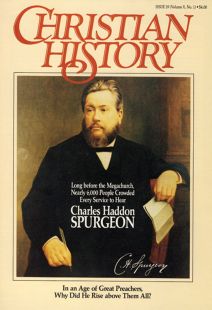From the Editor: Sleepy Preaching
AN OLD JOKE says that preaching is the art of talking in other people’s sleep. Charles Haddon Spurgeon turned that joke around; he once preached a sermon while he slept.
One Saturday night Spurgeon began talking in his sleep. His wife, Susannah, heard the noise and awoke. She realized her husband was preaching, so she listened attentively and in the morning gave her husband a detailed summary. A few hours later, he preached that sermon to his congregation.
To paraphrase the ads, “Seminarians, don’t try this at home.”
Marked by vivid word choice, ringing assertions, and sharp, sometimes barbed, wit, Spurgeon’s sermons clearly connected with his listeners. He told the story, for instance, of meeting a man who identified himself as an agnostic.
“ ‘Oh,’ I said to him, ‘that is a Greek word, is it not? The Latin word, I believe, is ignoramus.’
“He did not like that at all. Yet I only translated his language from Greek to Latin. These are queer waters to get into, when your philosophy brings you only the confession that you know nothing, and enables you to glory in your ignorance.”
Even in his own day, Spurgeon was considered the “prince of preachers.” A young artist named Vincent Van Gogh preached Spurgeon’s sermons in the ghettos of London, with numerous conversions. Missionary David Livingstone carried one of Spurgeon’s sermon tracts in his journeys across Africa.
Today, Spurgeon’s influence is still felt. Tom Carter, author of Spurgeon at His Best (Baker, 1988), wrote recently and said, “Each time I read one of Spurgeon’s sermons, I fall in love with preaching all over again. My faith is rescued from the temptation to consider the proclamation of God’s truth irrelevant. . . .
“I’m also challenged to preach biblically. As I read between the lines of these sermons, I hear Spurgeon saying to me, ‘As a preacher, your job is not to create your own material. Just discover what God has already said in his Word, and then relay that to your people.’ ”
This issue of Christian History explores the life and significance of this preaching giant, who continues to awaken preachers and preaching in our day. Even if he could preach with his eyes closed.
By Marshall Shelley
[Christian History originally published this article in Christian History Issue #29 in 1991]
Next articles
Compel Them to Come In
An earnest evangelistic appeal from the Prince of Preachers.
Charles Haddon SpurgeonThe Anguish and Agonies of Charles Spurgeon
Debilitating gout, poisonous slander, recurring depression—Spurgeon suffered them all. What happened to his faith as a result?
Darrel W. AmundsenSupport us
Christian History Institute (CHI) is a non-profit Pennsylvania corporation founded in 1982. Your donations support the continuation of this ministry
Donate



